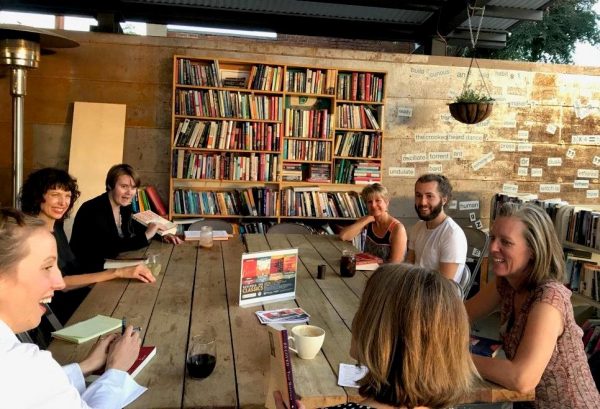Department communications intern and English major Michaela Hayes recently had the opportunity to ask Assistant Professor Lynn Shutters some questions about the Rekindle the Classics project she’s helping to facilitate. Here’s what she had to say about it, and a few other things.

Why Beloved?
To start with, it’s an amazing novel. And it’s widely recognized as an amazing novel. In 2006, The New York Times conducted a survey of the best U.S. novels, 1981-2006, and Beloved came out on top. Also, we want to recognize that classics are produced by men and women, as well as by people of all ethnicities. For this reason, too, Beloved seemed like a great choice.
How did Rekindle the Classics start?
Ellen Brinks, a Professor of English at Colorado State University, came up with the idea, and she developed it as a collaboration between the CSU English Department and Poudre River Public Library District. Currie Meyer, Council Tree Library Manager, has also been working with Rekindle since the beginning. The basic idea behind the program is that a lot of people are curious about “classic” literature, but might be a little intimidated by it, or might want someone with whom they can talk about it, or might just want to have a regular monthly meeting to encourage them to actually read that book. Rekindle the Classics is a program for those people. Also, it’s a great way to connect CSU to the wider community.
I should mention that Wolverine Farms Letterpress & Publick House also contributes to the program by letting us hold our meetings there.
Is it a nice break from Medieval literature? Or a nice addition?
It’s a bit of both. We actually did discuss a medieval classic last year, Chaucer’s Canterbury Tales. But Rekindle definitely gets me reading books outside medieval studies. For example, I’ve read Beloved before, but well over 15 years ago. I remember it being amazing, but, when I reread it, I was really blown away. And I’m excited for October’s book, H. P. Lovecraft’s The Call of Cthulhu and Other Weird Stories. Lovecraft is someone whom I’ve been curious about but never actually read.

Even as I’m reading more contemporary literature, I always have wheels turning in my mind about medieval literature. I ask myself: How are these classics similar to the medieval? How are they different? And that’s something I bring to the table in our monthly discussions. Even with a novel like Beloved, which seems as different from medieval literature as you could get, I found myself thinking about how memory and history are represented in that novel, and I was reminded of medieval ideas about both.
What do you like about the meetings?
They’re in a fun, casual place – we meet at Wolverine Farms Letterpress & Publick House. You can have coffee or a beer, if you like. There’s a discussion leader – someone from the CSU English Department, who provides some contextual information about the classic. So you have someone who’s done some extra thinking about the classic to help you along. And, most importantly, the meetings attract a variety of people. We have people in their 20s and people in their 60s, some from Oklahoma or Chicago, others who are Coloradoans born and bred, some who studied literature in college and want to get back into it, others whose studies and careers focus on other things.
Everyone has something to bring to the table. Discussions are lively and fun, smart but highly accessible. I encourage anyone who’s interested to show up for a session and check it out – no advance sign-up or anything like that is necessary.
Why do you like classic literature?
I think for me it started when I was a kid and was curious about authors whom I heard were “great.” I wanted to know why they were great and to be in on their greatness. I was about eight when I first tried to read Shakespeare (I didn’t get far, that time!) While I also like contemporary classics, I tend to be drawn to books that have made generations of people think, and I like to imagine how my thinking about a book compares to my parents’ thinking, or people from a 100 years ago, or 500 years ago.
I’ve heard jokes about English majors – what could they possibly do with Shakespeare that hasn’t been done before. But, to me, there’s always something more to do. Reading a classic isn’t about unlocking its true meaning. It’s about treating the text as a companion and thinking with it, and that’s what I enjoy.
What is a book you love to teach, or would love to teach given the opportunity? Why?
I actually really love teaching Milton’s Paradise Lost, even though as a seventeenth-century poem, it’s quite a bit later than the medieval literature I research. As the story of Adam and Eve, we all know how Paradise Lost is going to end, and yet, every time I read the poem, I find myself believing that there’s an alternative for the couple and feeling crushed that they just can’t take it. A scholar named Stanley Fish wrote a book about Paradise Lost titled Surprised by Sin – Fish examines how Milton manages to put us in the position of Adam and Eve and, like them, to be surprised by the story they’re caught up in. To me, that’s amazing, and when my students get surprised by sin in Paradise Lost, that’s amazing, too.
There are three Rekindle the Classics sessions remaining this semester, one being next week, Thursday October 18, 6:30 – 8:30 pm at the Wolverine Farm Latterpress & Publick House. We hope to see you there!
